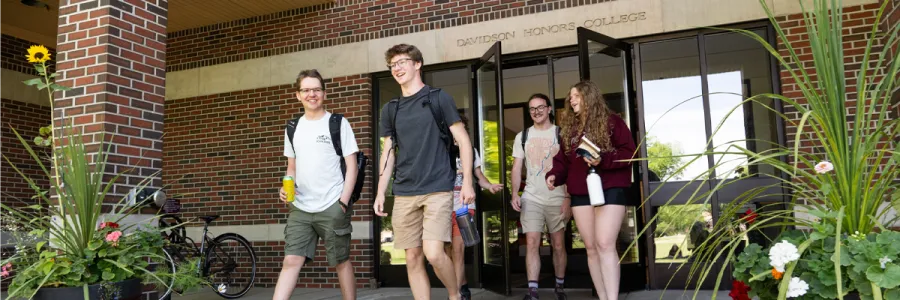Honors Capstone
Your honors capstone represents the culmination of your honors experience in the DHC. See below for robust details to help you get across the finish line as a University Scholar.
Honors Capstone Requirement
-
- Original research and/or creative scholarship: All research starts with a big question. One that doesn’t have an answer yet.
- Faculty mentor: This is a critical and impactful aspect of a capstone project. Working closely with a faculty mentor is personally enriching and it provides students with important touchstones at UM when it comes time to ask for letters of recommendation for jobs and graduate school applications.
- Final artifact: The outcome of your project (e.g., a novel, a website, a symphony, a research paper).
- Public presentation: Share your ideas in a public forum. This could be at UMCUR or another academic conference, a community event, a poetry reading, etc.
- Submitting artifact to : You’ll be published! ScholarWorks is a portal at the Mansfield Library for research conducted on the UM campus by students, staff and faculty. Submitting your capstone work to ScholarWorks is OPTIONAL, but HIGHLY RECOMMENDED. If you do submit to ScholarWorks, you'll have a citation for your research. That's pretty cool!
- Honors Capstone Reflection: Submitted to your faculty mentor
-
The Honors Capstone process is flexible and typically a little different for each student.
However, in general, it goes something like this:
FIRST YEAR:
- Take note of professors you connect with and become a "groupie": take additional courses they offer and go to their office hours. These professors could serve as potential faculty mentors for your honors capstone down the road.
- Once you’ve declared your major, investigate whether your department has a capstone option or requirement that could help you complete your honors capstone requirement.
SECOND YEAR:
- Continue to explore and narrow down your options for faculty mentors. Some departments assign students to a faculty mentor. If that’s the case, reach out to your assigned faculty mentor.
- Explore potential research or creative scholarship opportunities in your home academic department. Ask your advisors, check faculty and department websites, and feel free to reach out directly to faculty.
- Don’t forget about summer! That summer internship could be a spring board into a cool capstone project.
THIRD YEAR:
- Take a research methods or capstone prep course. The DHC offers HONR 320: Art of Inquiry and your home department may offer a similar course.
- Submit your and schedule a meeting with DHC Advisor, Bethany, to discuss your honors capstone plans.
FOURTH YEAR: It’s go time!
- Make sure you’ve registered for capstone credits: either 3 credits of HONR 499 or credits in your academic department + 1 credit of HONR 499. You'll need an override for these credits, so make sure you've completed your approval form.
- If you are in the Franke GLI, you will register for GLBD 499, only.
- Make sure you have a presentation venue in mind and make necessary arrangements for participation.
- Don’t forget to upload your project to .
-
- Work with your primary advisor to determine whether you have a capstone requirement or option in your academic program/s.
- Narrow down your ideas and questions- settle on a topic and methodology.
- Approach a faculty member to serve as your faculty mentor for the honors capstone project.
- Review the , where you’ll find guidelines for your proposal; the proposal itself has a list of questions that will help you establish a framework for your project.
- Once you can answer the eight proposal questions and you have a faculty mentor in place, !
- Ideally, you’ll submit your Honors Capstone Approval form at the end of your junior year, or with a summer and two semesters left before graduation. This isn’t practical for everyone and your honors advisor can help you identify the ideal timeframe based on your project.
- The DHC will review your proposal, follow up if there are questions or concerns, and then notify you when your project is approved.
- Your honors advisor will submit an override for you to register for HONR 499 credit/s once your project is approved.
-
Registration for HONR 499 credits requires an override, which will be provided upon review and approval of your .
Students have three options for capstone credit registration:
OPTION ONE: Students who do not plan to use capstone credits from their major, minor or certificate program should register for 3+ HONR 499 capstone credits. Your honors advisor can help you determine which semester of your final year is optimal for your capstone timeframe. The default number of credits is one (1), so make sure to go in after you register to select the appropriate number of credits.
OPTION TWO: Students planning to use a capstone from their major, minor or certificate should work with their primary advisor to register for their capstone credits AND their honors advisor to register for one (1) HONR 499 capstone credit in addition to the departmental credits (e.g., PSYX 499+ HONR 499).
OPTION THREE: Students planning to use their GLI capstone as their honors capstone will need to complete the required Honors Capstone form, but will not need to register for additional credits beyond GLBD 499.
-
All honors capstone projects must include a presentation. Why, you may ask?
- A critical component of an undergraduate liberal arts education is the ability to communicate effectively and articulate oneself in written, verbal and expressive contexts.
- Presenting your work in a public forum allows you to hone your communication skills. It also allows you to share your work with more than just your faculty mentor. People will learn from YOU!
Where can I present?
- 91次元 Conference on Undergraduate Research (UMCUR) is a popular option for capstone presentations.
- Another conference: The DHC is open and flexible to your ideas and preferences for a presentation, but the venue must be pre-approved.
- For fall graduates, the DHC hosts a capstone showcase in December.
- The DHC also hosts a creative showcase every year for creative scholarship.
Requirements for a Capstone Presentation:
- Presenting research/creative scholarship in a public venue to a relevant audience;
- Format for the presentation is flexible, but typically includes visuals (printed, performance-based, or IT-based (e.g., PowerPoint);
- Length/duration of presentation should be long enough to provide a comprehensive overview/demonstration of student work.

Emily Feiling
FAQ
-
Capstone projects are intended to provide DHC students with a substantial inquiry-based experience that encourages them to work in collaboration with a mentor over an extended period of time. These projects should challenge students to draw on knowledge and life experiences that they have attained throughout the course of their education, and apply them to an in-depth investigation of the chosen topic. Interdisciplinary innovation encouraged!
- Undergraduate research and creative scholarship look great on your resume, regardless of which field you’re in. This will help you get a job or go to graduate school.
- Capstone projects are an opportunity for you to make unique and original connections, weaving together your interests in an effort to answer an important question.
- Completing a significant project with the help of a mentor is a highly gratifying experience, resulting in personal and professional growth.
- Your Capstone project is a contribution to a field of study that you care about.
- YOU HAVE IMPORTANT IDEAS AND QUESTIONS!
-
Honors capstone projects are unique and specific to each student’s interests and questions.
Research and creative scholarship are broadly defined and projects typically take on a life of their own as they evolve. EACH PROJECT STARTS WITH A QUESTION.
- ORIGINAL RESEARCH = an exploration of a research question, posed by the student, involving a wide variety of research methods in an attempt to investigate the question.
- CREATIVE SCHOLARSHIP = the creation of original, new work in a creative field or the reinterpretation of existing work.
-
YES, you can count the capstone project you do in your academic major, minor or certificate towards your honors capstone. Please keep in mind that ALL DHC students MUST submit an and have their projects approved by the DHC, even if your capstone project is already pre-approved by your department.
IMPORTANT NOTE: If you plan to double-dip your departmental capstone with your honors capstone, you will need to register for BOTH the departmental capstone course AND one (1) credit of HONR 499. If you are using your GLI capstone for honors, you will not need to register for HONR 499, but you will need to complete the required Honors Capstone Approval form and register for GLBD 499.
-
- In some academic departments, students are assigned to a faculty mentor. Check with your primary advisor to see if you already have a faculty mentor assigned and then go meet with that person ASAP.
- Talk with your friends.
- Talk with your advisors.
- Talk with Department Chairs,
- Knock on doors.
- Send emails. When you reach out, start with a more formal email outlining your interest in working with them and why you think they are a good fit. It's best if you have a pre-existing relationship with the faculty mentor. It's harder to get a yes with a cold call. If you don't know them yet, take some time to introduce yourself.
- Be persistent, but be clear about your idea and your expectations. Faculty are busy, so you'll want to respect their time by being as organized as you can be.
- By and large, faculty love working with motivated undergraduate students who are excited about getting involved with undergraduate scholarship.
Faculty often have personal approaches to mentoring undergraduate research projects, however, in general, mentors for honors capstone projects can expect to have the following responsibilities associated with serving as a mentor for an honors capstone:
- From the onset of the project, faculty and community members assist students with determining the scope of the project and serve as a sounding board and mentor.
- Faculty and community members serving as mentors for students undertaking Honors Capstone projects should have significant expertise in the student’s academic area of interest as well as prior experience with the research/creative scholarship process.
- Faculty and community members serving as mentors can expect to assist students with the development of their research/creative scholarship question/s, review their proposal/s, help identify appropriate methodologies/avenues for inquiry, review and provide feedback on student’s capstone artifact, and support students in planning and executing their final presentations.
-
CAPSTONE ARTIFACT = TANGIBLE OUTCOME OF YOUR PROJECT
As you think about what type of artifact you’d like to end up with for your project, consider your goals.
Ask Yourself:
- Does it make sense to pursue a project that could be used down the line in an application for a job or graduate school? What would that look like?
- Is the purpose of your project solely to push yourself beyond your current scholastic boundaries?
- Would it be helpful to learn a new set of skills (technique, analysis, field work?)
- What am I curious about?
Past Examples of Artifacts Have Included:
- Traditional thesis-style papers, art exhibits, websites, brochures created for local non-profits, curricula, novels, theater productions, on and on.
- IMPORTANT NOTE: Your presentation DOES NOT count as your final artifact. Your final artifact should be the complete, final, and comprehensive version of your project. Your presentation is about that artifact.
-
ScholarWorks is an online portal and resource for research conducted by students, staff and faculty at the 91次元, managed by the Mansfield Library. DHC graduates upload electronic versions of their honors capstone artifacts to ScholarWorks as their final step in the capstone process.
What does uploading research to ScholarWorks mean for me?
*It means you’re a published scholar and you and other scholars can site your work in their research!
Please direct questions about ScholarWorks to Mansfield Library staff.
